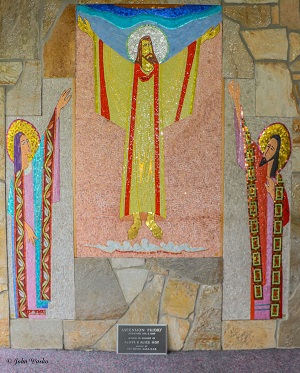St. Thomas More
Susan Pohl
St. Thomas More, who is honored as a Benedictine oblate, was born in 1478 in London. As a young man, he studied law, Greek, philosophy, and theology. He was attracted to the monastic life and for a period of time lived close to a Carthusian monastery. There he participated daily in the life of the Carthusians, sleeping little and wearing a hair shirt. He yielded to his father's pressure to become a lawyer and was admitted to the bar in 1501. He married in 1504.
St. Thomas performed his secular job well, but his interest in the sacred continued to be a central part of his life. His entire household, including servants, met daily to pray; Scripture was read aloud during dinner. He rose in rank from lawyer to undersheriff, to royal counselor, to ambassador, and, after being knighted, to undertreasurer, then chancellor of the Duchy of Lancaster, and, finally, lord chancellor of England. He was highly respected by many as a wise and just man.
When King Henry VIII attempted to elevate his own authority over the church and to establish the children he had with Anne Boleyn as royal heirs, St. Thomas refused to sign the required oath and resigned from office. King Henry pursued his insistence of More's loyalty, perhaps to gain public approval because of St. Thomas's following or perhaps to solidify his position by either forcing More to sign or doing away with him. St. Thomas was imprisoned in the Tower of London for two years. In addition to what he endured there, his family suffered and was reduced to poverty, but still he would not yield. To the jury at his trial he said, "Ye must understand that, in things touching conscience, every true and good subject is more bound to have respect to his said conscience and to his soul than to any other thing in all the world beside."
At his trial false evidence was introduced so that he was found guilty and sentenced to execution. Four days later he walked to the platform, asked the people for their prayers, and stated that he died for the Holy Catholic Church, adding that he was "the King's good servant, but God's first."
St. Thomas More maintained his sense of integrity throughout his life and even in the face of death. If only more of us had such a strong sense of right and were as true to our conscience, that "still, small voice" that reminds us that we, too, are God's servants first.


